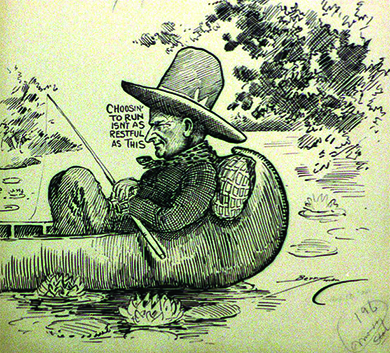| << Chapter < Page | Chapter >> Page > |
Although the Harding presidency had a number of large successes and variety of dark scandals, it ended before the first term was up. In July 1923, while traveling in Seattle, the president suffered a heart attack. On August 2, in his weakened condition, he suffered a stroke and died in San Francisco, leaving the presidency to his vice president, Calvin Coolidge. As for Harding, few presidents were so deeply mourned by the populace. His kindly nature and ability to poke fun at himself endeared him to the public.

Listen to some of Harding’s speeches at The University of Virginia’s Miller Center’s website.
Coolidge ended the scandals, but did little beyond that. Walter Lippman wrote in 1926 that “Mr. Coolidge’s genius for inactivity is developed to a very high point. It is a grim, determined, alert inactivity, which keeps Mr. Coolidge occupied constantly.”
Coolidge had a strong belief in the Puritan work ethic: Work hard, save your money, keep your mouth shut and listen, and good things will happen to you. Known as “Silent Cal,” his clean image seemed capable of cleaning up scandals left by Harding. Republicans—and the nation—now had a president who combined a preference for normalcy with the respectability and honesty that was absent from the Harding administration.
Coolidge’s first term was devoted to eliminating the taint of scandal that Harding had brought to the White House. Domestically, Coolidge adhered to the creed: “The business of America is business.” He stood in awe of Andrew Mellon and followed his fiscal policies, which made him the only president to turn a legitimate profit in the White House. Coolidge believed the rich were worthy of their property and that poverty was the wage of sin. Most importantly, Coolidge believed that since only the rich best understood their own interests, the government should let businessmen handle their own affairs with as little federal intervention as possible. Coolidge was quoted as saying, “The man who builds a factory builds a temple. The man who works there worships there.”
Thus, silence and inactivity became the dominant characteristics of the Coolidge presidency. Coolidge’s legendary reserve was famous in Washington society. Contemporaries told a possibly apocryphal story of how, at a dinner party at the White House, a woman bet her friends that she could get Coolidge to say more than three words. He looked at her and said, “you lose.”
The 1924 election saw Coolidge win easily over the divided Democrats, who fought over their nomination. Southerners wanted to nominate pro-prohibition, pro-Klan, anti-immigrant candidate William G. McAdoo. The eastern establishment wanted Alfred E. Smith, a Catholic, urban, and anti-prohibition candidate. After many battles, they compromised on corporation lawyer John W. Davis. Midwesterner Robert M. La Follette, promoted by farmers, socialists, and labor unions, attempted to resurrect the Progressive Party. Coolidge easily beat both candidates.
This cultural battle between the forces of reaction and rebellion appeared to culminate with the election of 1928, the height of Republican ascendancy. On August 2, 1927, Coolidge announced that he would not be participating in the 1928 election; “I choose not to run,” was his comment ( [link] ). Republicans promoted the heir apparent, Secretary of Commerce Herbert Hoover. The Democrats nominated Governor Alfred E. Smith of New York. Smith represented everything that small-town, rural America hated: He was Irish, Catholic, anti-prohibition, and a big-city politician. He was very flamboyant and outspoken, which also did not go over well with many Americans.

Republican prosperity carried the day once again, and Hoover won easily with twenty-one million votes over Al Smith’s fifteen million. The stock market continued to rise, and prosperity was the watchword of the day. Many Americans who had not done so before invested in the market, believing that the prosperous times would continue.
As Hoover came into office, Americans had every reason to believe that prosperity would continue forever. In less than a year, however, the bubble would burst, and a harsh reality would take its place.
After World War I, Americans were ready for “a return to normalcy,” and Republican Warren Harding offered them just that. Under the guidance of his big-business backers, Harding’s policies supported businesses at home and isolation from foreign affairs. His administration was wracked by scandals, and after he died in 1923, Calvin Coolidge continued his policy legacy in much the same vein. Herbert Hoover, elected as Coolidge’s heir apparent, planned for more of the same until the stock market crash ended a decade of Republican ascendancy.

Notification Switch
Would you like to follow the 'U.s. history' conversation and receive update notifications?